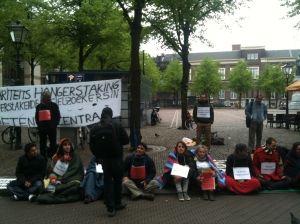The Hague – Activists on their second day of hunger strike have been supporting imprisoned asylum seekers in the Netherlands who officially started the strike on 1 May 2013, protesting against a dysfunctional asylum Dutch policy.
Around 20 activists were gathered today at Plein in The Hague city centre to hold a hunger strike that has started yesterday morning at 10.00 on a rainy day.
Jan Willem Hordijk, a spoke-person of the peaceful sit-in, is a student at Ede University and member of ‘Kritische Studenten Utrecht’ and ‘Deportation Resistance Group’. “Hunger strikes have a strong impact on the public and our strike is also a solidarity statement to support the thousands refugees who have been unjustly imprisoned in Holland”, he stated today.
The protest though is not only for those imprisoned but also to thousands refugees who live ‘trapped’ in The Netherlands on the streets, without documents, without money, without access to services.
According to the latest statistics of the ministry of Justice, around 100,000 people live illegally in the Netherlands, 45,000 people of this group have an asylum background. Around 10,000 voluntarily return to their country of origin, because they often end up living on the streets.
Allawy, an Iraqi citizen, is a refugee and asylum seeker in The Netherlands since 2007 when he arrived to the country. “I stayed for the first three years in an asylum centre in Alkmaar, then I was thrown on the streets due to the negative judgment of my application. Since then I lived with the help of churches and friends.”
Allawy is one of the many ‘homeless’ refugees. Every year around 6.000 asylum seekers, whose applications have been denied at the last appeal, live on the streets. Many undocumented refugees get the residency though, others obtain a Refugee Residency Permit, others have children with Dutch nationality thus can stay, and others receive a legal residency due to medical issues.
The Dutch policy on asylum has seen many developments and changes since 1998, when the principle of personal responsibility was enacted. In case asylum seekers were difficult to be deported, they were put on the streets with an order to organize their own return to their home country.
However, refugees face many hurdles in ‘organizing their return’ while living on the streets and with no access to basic social services. Returning is not possible for many of them because their country of origins will not accept them back; examples are Ethiopia, China, Mauretania, Yemen, Mali, and Guinea, which in only some cases allow this measure.
As a result, rejections of asylum applications increased and the number of asylum applicants drastically decreased from about 47.000 a year before 1999 to 14.000 in 2011 – EU and UN data revealed.
In 2011 the Dutch Prime Minister Mark Rutte claimed at a cabinet meeting in The Hague that: “The asylum policy will become more selective and more restrictive”.
Human Rights Watch and the EU commissioner Cecilia Malmström expressed concerns many times regarding the tougher and tougher Dutch immigration and asylum policy. The Netherlands adopts an “integration test” only with immigrants from specific countries who want to join their family members or spouses. Citizens from the European Union (EU), the European Economic Area (EEA), Switzerland, Australia, Canada, Japan, New Zealand, South Korea, and the US are exempted from this test and from any financial requirements to be met.
On 17th of January 2013 the Russian asylum seeker Aleksandr Domatov committed suicide in the detention Centre of Rotterdam Airport. The SP Parliament Member Sharon Gesthuizen strongly questioned the effectiveness of the Dutch asylum policy, nonetheless its inhumanity.
The Netherlands represents today one of the strictest European countries in terms of asylum and immigration policy and is holding the European record for detaining non-documented refugees.
Laura Zuffi

[…] On-going hunger strike in The Hague to support imprisoned asylum seekers in The Netherlands (theglobaloyster.wordpress.com) […]